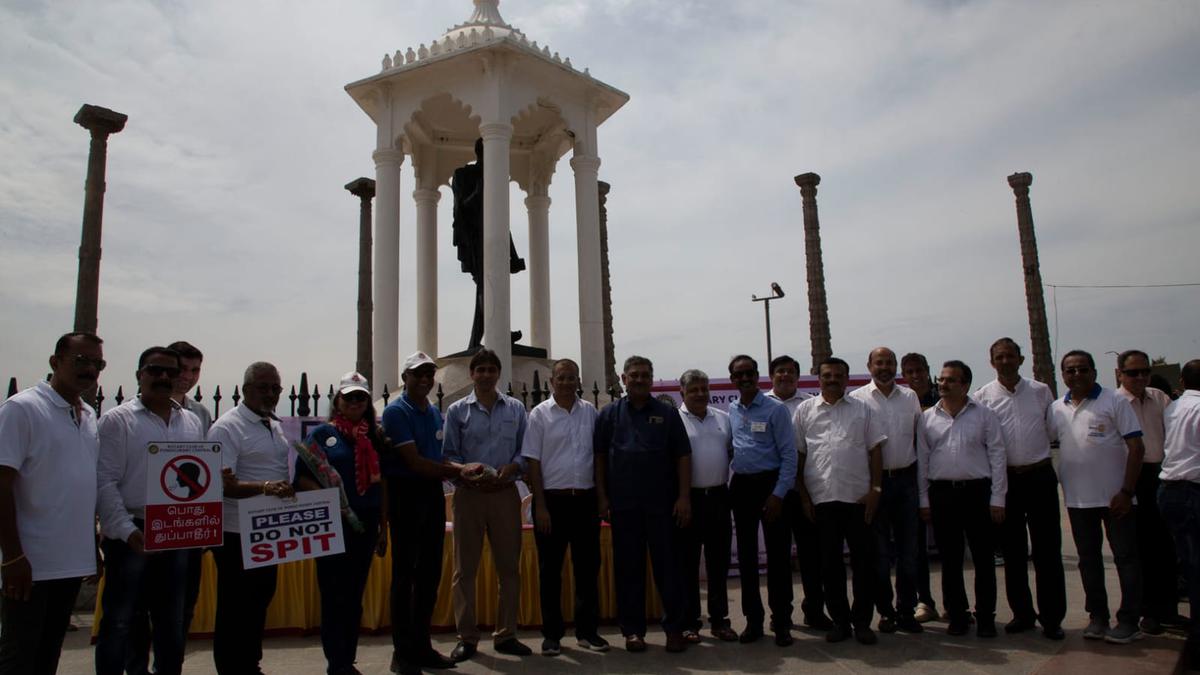
Rally held in Puducherry to raise awareness about not spitting in public places
The Hindu
Rotary Club of Pondicherry Central and Sare Jahan Se Acha Foundation join forces to host "Anti-Spitting Rally" at Promenade Beach. Led by S. Bascarane, Kumaran, Bipin Rananaware, Karn Parekh, and Priti Raja, volunteers from schools and colleges pledge to keep city clean. Rally includes patriotic song, game to foster community engagement, and pledge to avoid spitting in public places.
Rotary Club of Pondicherry Central and Sare Jahan Se Acha Foundation, Pune, collaborated to host an “Anti-Spitting Rally” and took a pledge to keep the city clean at Promenade Beach on Sunday.
S. Bascarane, Superintendent of Police; Kumaran, assistant governor, RI Dist. 2981; Bipin Rananaware and Karn Parekh, Rotarians; and Priti Raja, co-founder of the foundation, led the event.
According to a press note, the Rotary Club had partnered with Sare Jahan Se Acha Foundation, which holds the record for travelling 40,000 km through 21 Union Territories and States in India, as a response to the ongoing concerns regarding public health and sanitation in the community.
Ms. Priti said spitting was never considered garbage, but not only was it garbage, but it also carries a potential health risk, and this fact was made apparent during COVID-19.
Volunteers from schools and colleges, including Saradha Gangadharan College and the government school of Thiruchitrambalam, also participated in the event, which included a pledge to avoid spitting in public places, mass rendering of a patriotic song, and a game aimed at fostering community engagement.

“Writing, in general, is a very solitary process,” says Yauvanika Chopra, Associate Director at The New India Foundation (NIF), which, earlier this year, announced the 12th edition of its NIF Book Fellowships for research and scholarship about Indian history after Independence. While authors, in general, are built for it, it can still get very lonely, says Chopra, pointing out that the fellowship’s community support is as valuable as the monetary benefits it offers. “There is a solid community of NIF fellows, trustees, language experts, jury members, all of whom are incredibly competent,” she says. “They really help make authors feel supported from manuscript to publication, so you never feel like you’re struggling through isolation.”

Several principals of government and private schools in Delhi on Tuesday said the Directorate of Education (DoE) circular from a day earlier, directing schools to conduct classes in ‘hybrid’ mode, had caused confusion regarding day-to-day operations as they did not know how many students would return to school from Wednesday and how would teachers instruct in two modes — online and in person — at once. The DoE circular on Monday had also stated that the option to “exercise online mode of education, wherever available, shall vest with the students and their guardians”. Several schoolteachers also expressed confusion regarding the DoE order. A government schoolteacher said he was unsure of how to cope with the resumption of physical classes, given that the order directing government offices to ensure that 50% of the employees work from home is still in place. On Monday, the Commission for Air Quality Management in the National Capital Region and Adjoining Areas (CAQM) had, on the orders of the Supreme Court, directed schools in Delhi-NCR to shift classes to the hybrid mode, following which the DoE had issued the circular. The court had urged the Centre’s pollution watchdog to consider restarting physical classes due to many students missing out on the mid-day meals and lacking the necessary means to attend classes online. The CAQM had, on November 20, asked schools in Delhi-NCR to shift to the online mode of teaching.









